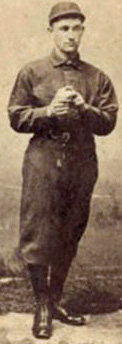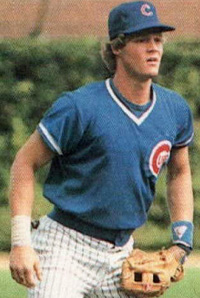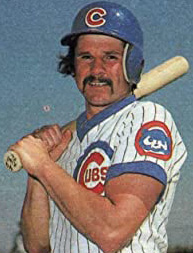Baseball Hall of Shame Nominees: Not So Dazzling Debuts The Baseball Hall of Shame: The Best of Blooperstown, Bruce Nash and Allan Zullo (2012)
John Francis "Phenomenal" Smith
Pitcher, Brooklyn, American Association, 1885
For sheer shame, nothing will ever match "Phenomenal"Smith's pitching debut with Brooklyn. He was slaughtered 18–5 in a scandalous loss that was—yet wasn’t—his fault.
The utter disgrace of this game cannot be fully understood by reading the box score, which shows that of the 18 runs scored against him, only 11 were earned.
The seed of ignobility was planted by John Francis Smith himself. The 5-foot-6-inch, 20-year-old lefty possessed an enormous ego and gave himself the nickname Phenomenal. After playing in six games the previous year with two other teams, he joined Brooklyn (then known as the Trolley Dodgers of the American Association). The cocky pitcher told his new club that he was so good that he could win even if the players didn’t play well. Such brashness did not endear him to his teammates. In fact, they downright hated him. And they took him up on his boast that he could win without their support.
Making his debut for Brooklyn at home against St. Louis, Phenomenal quickly discovered that his fellow players made no effort to conceal their antipathy toward him. They were determined to see him lose—and lose big—which he did. He pitched the entire game, giving up 12 hits, issuing six walks and striking out two. Other than third baseman Bill McClellan, who played to win despite his dislike for Smith, the infielders intentionally dropped pop-ups, let grounders skip through their legs, and threw wildly as they racked up 14 errors. Their misplays were so blatant that the players were roundly booed by the 1,600 disgusted spectators at Washington Park.
The next day, the Brooklyn Eagle condemned "the disgusting rottenness which prevailed in the ranks of the team." The paper blasted the conspirators for not having "brains enough to properly conceal their little game." The Eagle declared, "They so plainly exposed their hands in their crooked work that the occupants of the grandstand saw it, and it aroused their just indignation to such an extent that they hissed the wretched muffing work of the [Brooklyn players]." Shortstop Germany Smith was the most flagrant fumbler, committing seven errors, while catcher Jackie Hayes made two miscues and was charged with five passed balls. The official box score does not reflect the easy fly balls and grounders that the Brooklyn fielders let go untouched for base hits. "It's an outrage!" stormed Charlie Byrne, president of the Brooklyn club, after the debacle. "The way my men treat this new player is a disgrace, and I will take steps to punish them for it." He did, too, by fining each of the guilty players. He made one other move to ensure team harmony—he reluctantly released Phenomenal Smith after his Brooklyn debut. |

Phenomenal Smith
|
Pat Tabler
2B, Chicago Cubs, 1981
The only thing Pat Tabler needed to make his Major League debut complete was a deep dark hole to crawl into and hide.
"They don’t have any holes in the middle of the infield at Wrigley Field, but I sure was looking for one," recalled Tabler. "It was the most embarrassing predicament I'd ever been in. I just wanted to disappear. I even prayed for a tornado to come down and get me out of there."
The Chicago Cubs front office had touted Tabler as "the second baseman of the future." But in his first game, which was against the visiting San Francisco Giants, the rookie looked like just another member of the same old sorry Cubs.
"When I started the game, I was so excited I couldn’t concentrate," Tabler recalled. "I had to keep pinching myself to realize I was really playing in Wrigley Field. I even got a hit [a single] my first time up in the big leagues, and I thought, 'Oh, wow! This is awesome!' I was just going through the motions because I was practically in shock. I didn’t know the number of outs, the inning, or even the score."
And that was the problem.
In the top of the eighth inning with the score tied 3–3, the Giants loaded the bases with one out. Pinch hitter Jim Wohlford then tapped a made-to-order double-play ball to shortstop Ivan De Jesus. It should have been a textbook twin killing, but apparently Tabler hadn’t read the book.
De Jesus scooped up the ball and tossed it to Tabler, who stepped on the bag for the force-out at second. But he didn’t pivot and throw to first to record his first Major League double play. Instead, Tabler kept the ball and ran toward the Cubs third base dugout—while the lead runner scampered across the plate with what proved to be the winning run.
"I knew I had screwed up when [Cubs third baseman] Kenny Reitz came running at me, screaming, 'No! No! No!'" said Tabler. "Then it hit me. There were only two outs! I started to throw to first, pretending that I really knew what I was doing, but it was much too late. I felt like I’d been caught naked out there in front of all those people. The only bright spot was that it wasn’t on national television."
Because of that gift run, the Cubs lost 4–3. "When I came into the clubhouse, all the writers were there in front of my locker waiting for me," said Tabler. "I knew then that I really was in the big leagues."
Tabler went on to play 12 years in the bigs, mostly as an outfielder or first baseman. After his debut season, he played only seven games at second base for the rest of his career. Apparently, they’d seen enough of him at that position. |

Pat Tabler

Kenny Reitz
|
|
|